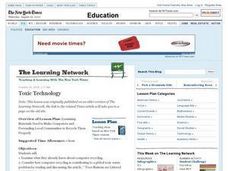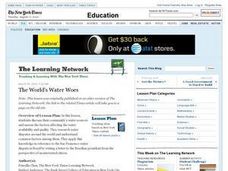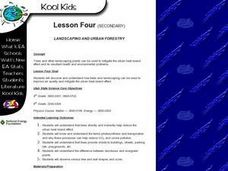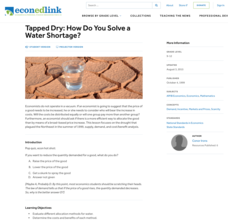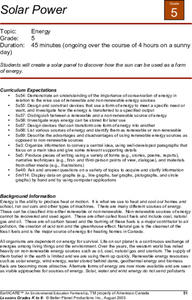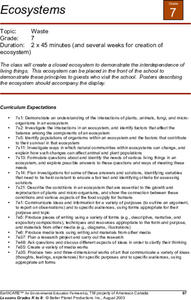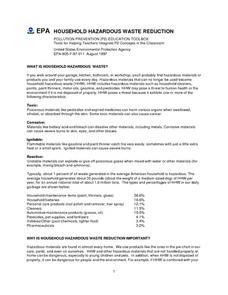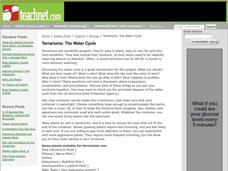Curated OER
Government Gripes
Students, in groups, investigate the purpose and jurisdiction of government agencies assigned to regulate different science/technology/health issues, then describe situations in which agencies might have a disagreement, and stage a mock...
Curated OER
Investigation 9 - Bird Study
Fourth graders examine specific bird characteristics and become more aware of the ecosystems that support each bird. They engage in bird walks, mapping the areas where they find evidence of bird activity.
Curated OER
Alien Invasions
Students create an educational pamphlet on the origins, spread and impact of invasive plant species in their community.
Curated OER
Cardboard Tree and Endangered Animals Lesson
Students create endangered animal figures and their habitats.
Curated OER
TOXIC TECHNOLOGY
Students examine what they already know about computer recycling and cconsider how computer recycling is contributing to a global toxic waste problem by reading and discussing the article, ""Poor Nations are Littered With Old PC's,...
Curated OER
The World's Water Woes
Students discuss their community's water sources and assess the factors affecting the water availability and quality. They research water disputes around the world and explain common factors among them.
Curated OER
Landscaping and Urban Forestry - Lesson 4 (Grades 5-6)
Young scholars discuss reasons to plant trees and the best locations for cooling. They analyze two homes identifying types and locations of trees, and location of the central air conditioners. The benefits of shade, the process of...
Curated OER
Landscaping And Urban Forestry - Lesson 4 (Grades 8-9)
Students discuss reasons to plant trees and the best locations for cooling. They study two homes and identify types and locations of trees and determine the placement of the central air conditioners. The class plans a landscape design...
Council for Economic Education
Tapped Dry: How Do You Solve a Water Shortage?
Students, after evaluating different allocation methods for water, determine the costs and benefits of each method.
Curated OER
THE INCREDIBLE JOURNEY
Students describe the movement of water within the water cycle and identify the states of water as it moves through the water cycle.
Curated OER
Taking From the Giving Tree
Students explore the ways in which various American cities negotiate the protection of their "green infrastructure," gaining a broader understanding of proposed and enacted legislation as it relates to preserving and planting trees in...
Curated OER
Being Resource-ful
Students compare the amount of waste that comes from different bags of equivalent amounts of potato chips and decide which would produce the least amount of waste. They discuss recycling and other ways they can reduce waste.
Curated OER
Solar Power
Fifth graders create their own solar panel. They use this experiment to see how the sun can be used as a form of energy.
Curated OER
Ecosystems
Seventh graders create a closed ecosystem and place it where is it visible to others in the school. They label it with posters describing the interdependence of living things in the ecosystem. They discuss what might happen to the...
Curated OER
Water Pollution Prevention and Conservation
Students examine how to conserve water. They also discover how to prevent water pollution. They examine the Earth's water distribution as well.
Curated OER
Pollution Prevention in Schools
Students review P2 concepts they learned in previous lessons and explore how to reduce the pollution in their school. They also examine ways to conserve energy.
Curated OER
Household Hazardous Waste Reduction
Students discover the different types of hazardous waste. They examine ways to dispose of the hazardous materials safely and without harming the environment.
Curated OER
Energy Conservation
Students discuss the different uses of energy. They examine the consumption percentages to do household tasks. They discover ways to reduce their energy consumption.
Curated OER
The Water Cycle
Students create terrariums in containers in order to study the Water Cycle. They examine how the terrarium maintains life in the closed environment.
Curated OER
Endangered Species
High schoolers explore the issue of endangered species. They read a summary sheet and case history handout, complete a summary form, define key vocabulary terms, and participate in a class discussion.
Curated OER
Air Pollution
Students explore the topic of air pollution. They complete a KWL chart, answer discussion questions, and define key vocabulary terms.
Curated OER
Oceans and Coasts
Students explore the topic of marine pollution. They define key vocabulary words, list examples of marine pollution, complete a true/false handout, read an article, and participate in a class discussion.
Curated OER
Waste Management
Students explore the topic of waste management. They define key vocabulary words, take a pre-quiz, complete a questionnaire, evaluate their own waste reduction habits, and write a short summary.
Curated OER
EPA's Superfund Program
Young scholars work together to gather information about the EPA's Superfund program. They discuss how to improve human health and the environment. They discover how hazardous wastes are characterized and cleaned up.






